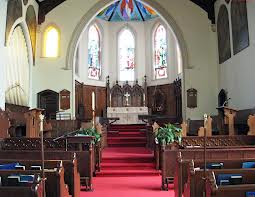L
LequteMan
Guest
The Anglican Bishop of Ngbo, in Ebonyi, Rt. Rev Christian Ebisike, has described the decision of the Church of England (CofE) to allow women to become bishops as a ``deviation’’ from Bible’s teachings.
Speaking to the News Agency of Nigeria (NAN) on Tuesday in a telephone interview in Abuja, Ebisike said the decision of England to admit women to the episcopate would further strain its relationship with the Church of Nigeria (Anglican Communion).
His comments came a day after the Church of England’s Synod voted in favour of measures that would pave the way for women to be ordained as bishops.
The synod voted 351 members in favour of the measures, 72 opposed and 10 abstained.
``The Archbishop of Canterbury (Justin Welby) and by extension the Church of England did not do their homework very well and I do not think they consulted widely with other Provinces of the Anglican Communion.
``The Church of England should see itself as a role model for the Anglican Communion but unfortunately, it is not living up to that role.
``From the Bible and Church history, there was no woman apostle, women served as evangelists and teachers in the early church.
``A bishop is a universal figure; where a bishop is not recognized by some parts of the communion, that is not a bishop.
``When you ordain a bishop and he is not recognized by some parts of the communion that is not a bishop,’’ Ebisike said.
He hinted that the House of Bishops of the Church of Nigeria, through the Primate, Archbishop Nicholas Okoh, would likely issue a formal statement on the issue.
He, however, noted that the Church of Nigeria had maintained a consistent position on the issue of ordination of women over the years.
``In 2005, the Standing Committee of the Church resolved that the Church of Nigeria was not ripe for the ordination of women.
``A pastoral letter issued same year by Archbishop Peter Akinola, the then Primate, strongly reaffirmed that.
``The Church arrived at this conclusion after a wide consultation with members of the House of bishops, clergy and laity and other ecumenical partners.
``What was interesting in Nigeria was that it was the womenfolk of the Church who were sternly opposed the ordination of women.
`The Church approved Diaconate Ordination which allows women to come into the ``ordained ministry’’ but they would remain deacons as long as they wish to be part of the ministry,’’ he said
Speaking to the News Agency of Nigeria (NAN) on Tuesday in a telephone interview in Abuja, Ebisike said the decision of England to admit women to the episcopate would further strain its relationship with the Church of Nigeria (Anglican Communion).
His comments came a day after the Church of England’s Synod voted in favour of measures that would pave the way for women to be ordained as bishops.
The synod voted 351 members in favour of the measures, 72 opposed and 10 abstained.
``The Archbishop of Canterbury (Justin Welby) and by extension the Church of England did not do their homework very well and I do not think they consulted widely with other Provinces of the Anglican Communion.
``The Church of England should see itself as a role model for the Anglican Communion but unfortunately, it is not living up to that role.
``From the Bible and Church history, there was no woman apostle, women served as evangelists and teachers in the early church.
``A bishop is a universal figure; where a bishop is not recognized by some parts of the communion, that is not a bishop.
``When you ordain a bishop and he is not recognized by some parts of the communion that is not a bishop,’’ Ebisike said.
He hinted that the House of Bishops of the Church of Nigeria, through the Primate, Archbishop Nicholas Okoh, would likely issue a formal statement on the issue.
He, however, noted that the Church of Nigeria had maintained a consistent position on the issue of ordination of women over the years.
``In 2005, the Standing Committee of the Church resolved that the Church of Nigeria was not ripe for the ordination of women.
``A pastoral letter issued same year by Archbishop Peter Akinola, the then Primate, strongly reaffirmed that.
``The Church arrived at this conclusion after a wide consultation with members of the House of bishops, clergy and laity and other ecumenical partners.
``What was interesting in Nigeria was that it was the womenfolk of the Church who were sternly opposed the ordination of women.
`The Church approved Diaconate Ordination which allows women to come into the ``ordained ministry’’ but they would remain deacons as long as they wish to be part of the ministry,’’ he said


